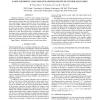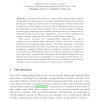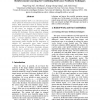769 search results - page 124 / 154 » Reducing the cognitive complexity of business process models |
ICIP
2008
IEEE
14 years 9 months ago
2008
IEEE
Multiuser collusion is an effective attack against traitor-tracing multimedia fingerprinting, where a group of attackers collectively mount attacks to reduce their risk of being d...
AAAI
2000
13 years 8 months ago
2000
As applications for artificially intelligent agents increase in complexity we can no longer rely on clever heuristics and hand-tuned behaviors to develop their programming. Even t...
ATAL
2004
Springer
14 years 24 days ago
2004
Springer
The process of pair partnership formation is an important infrastructure for many plausible MAS applications. Each agent evaluates potential partner agents, where each potential m...
ICSE
2007
IEEE-ACM
14 years 7 months ago
2007
IEEE-ACM
Abstract. In software architecture, components represent the computational units of a system and connectors represent the interactions among those units. Making decisions about the...
ICCV
2003
IEEE
14 years 21 days ago
2003
IEEE
Relevance feedback (RF) is an interactive process which refines the retrievals by utilizing user’s feedback history. Most researchers strive to develop new RF techniques and ign...



